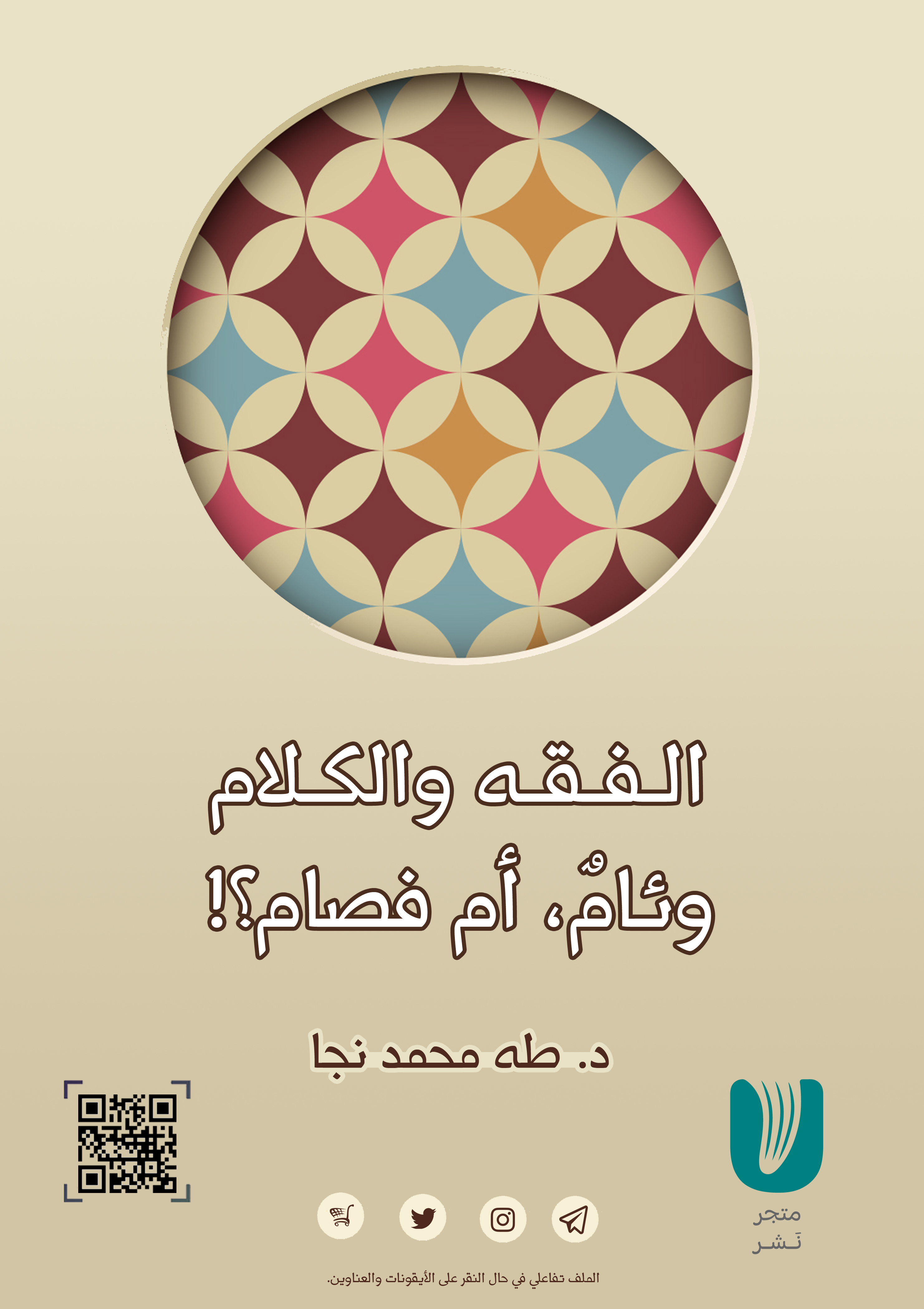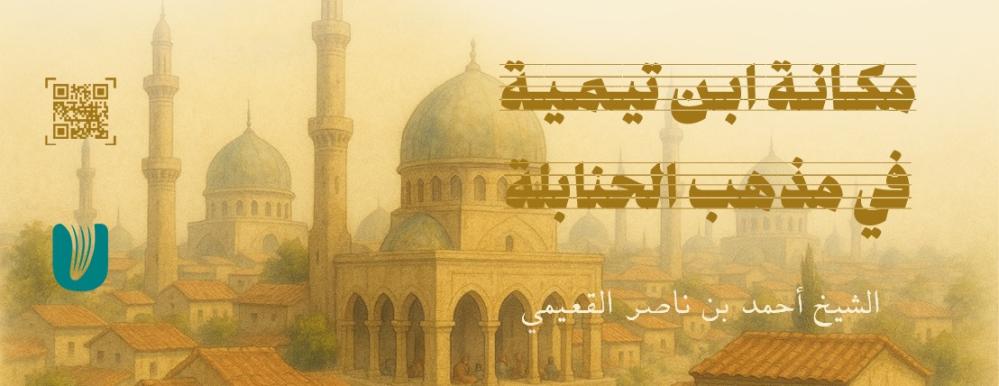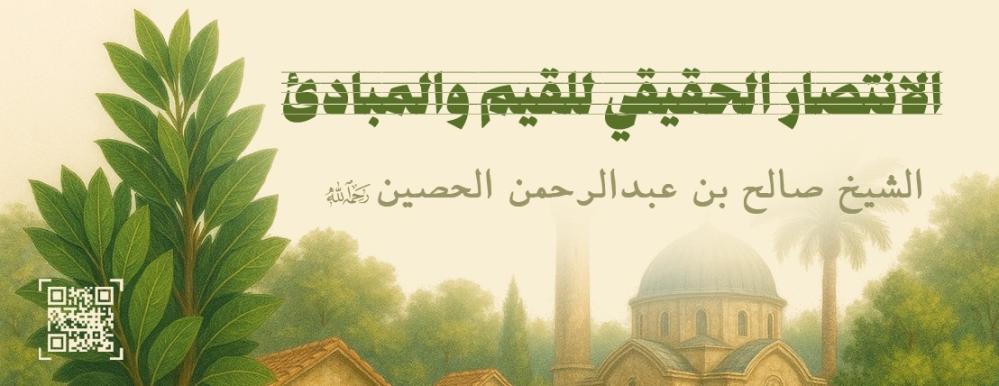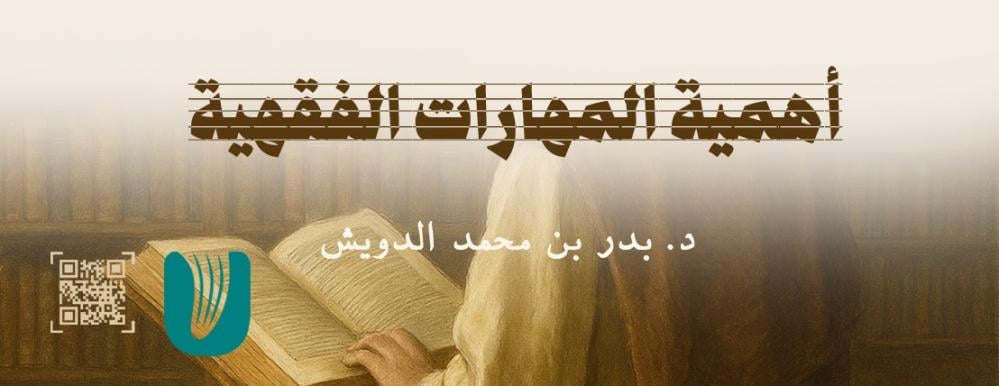Jurisprudence and speech... harmony, or schizophrenia?!
Dr.. Taha Muhammad Naja
Here we do not need to overestimate the relationship between the science of theology and other sciences of Sharia, and claim that the other sciences are its servants ( [1] ), nor is it necessary for us to lean toward the other side in the history of that relationship, so we claim that the science of theology He remained a servant of jurisprudence, until he freed himself from it in the fourth or third century ( [2] ); It is enough for us to conclude from these two aspects that the science of jurisprudence (branches) and the science of theology (fundamentals) ( [3] ) had a close relationship and connection between them, which brought them together in one framework, such that it was possible for an observer to see what united them. The bond between the servant and the served, or the necessary and the obligated.
In other words: The two sciences were all members of the knowledge of the afterlife, which includes the conditions of hearts, the ranks of deeds, and everything that helps on the path to the afterlife. It includes all of this in the general, comprehensive scope of useful knowledge ( [4] ). This is what Al-Halimi (d. 403 AH) expresses by saying: “Specifying the name of jurisprudence with this term: an accident..; The truth is that the name of jurisprudence includes all of the Sharia, which includes, among other things: what leads to the knowledge of God, His oneness, His sanctification, and all of His attributes, and to the knowledge of His prophets and messengers, peace be upon them, including the knowledge of conditions, morals, and etiquette, and fulfilling the right of servitude, and so on”( [5] ).
It is a phrase, insofar as it dates the idea to which we referred; It insinuates a lack of acceptance of that separation, or a dissatisfaction with its implications, including depriving the science of theology of that praised title ( jurisprudence ), and the consequences of that deprivation; This is what Al-Halimi explicitly mentions afterwards:
“It is not with us, in glorifying the name of jurisprudence, or mentioning the name of opinion: that we are lonely, nor is that with the one from whom we find displeasure; For, praise be to God, we are among the people of all of that... But it is dismaying to us that what is not excluded from the totality of jurisprudence is taken out of it, so that this is used as an excuse to reject and abandon him, belittle his rights, and disdain his destiny”( [6] ).
If mixing between these sciences and others like them was possible in the beginning, Where the legal sciences are newly established, and where everyone comes from principles, the issues of the two sciences follow a single cognitive system. The development of sciences, the expansion of classification, the spread of sects, the multiplicity of curricula, and educational necessities, all of this - and other things - would have left no place for this first view, and would have opened the door towards the natural differentiation between these sciences, and the uniqueness of each in the field that it eventually became.
We say this, while realizing that this separation - logical, as we see - was not a divorce at all (!!); Nor is it possible, in fact: for each science, with its field of knowledge, to be isolated far from the other. Rather, there remained, after the sharing: commonalities between the two sciences; As Abu Hayyan al-Tawhidi (d. after 400 AH) expresses it by saying: “His chapter - meaning: the science of theology -: is adjacent to the chapter of jurisprudence, and the discussion between them is common; Even if there is separation and disparity between them; The partnership between them is a reality, and the evidence between them is conflicting” ( [7] ).
Perhaps the clearest and closest example of these common boundaries is to remember that the two sciences were an extension of the science of the principles of jurisprudence ( [8] ), which is “a common science between jurists and theologians” ( [9] ); This is a science - with its head - that the two sciences, all of them, participate in establishing, and it is clear that this participation will open the channels of communication, once again, and provide various opportunities to influence and be influenced.
As for the issues and the vocabulary of the sciences, we mention - for example - the issue of worship and its concept, and it is known what the status of this issue is in the whole religion, and it is a common value between the two sciences, and each of them needs it in its issues and branches, and this is what appears from this text by Imam Al-Nawawi ( Died: 676 AH):
“The scholars differed regarding the definition of worship: Most said: Worship; Obedience to God Almighty, and obedience is in agreement with the command. This was also reported from the author [Al-Shirazi].
In his book on theological and jurisprudential limits, the author mentioned a difference in worship, and he said: Worship, worship, and asceticism in a sense, which is submission and submission; The definition of worship is what we worship with in the form of closeness and obedience...
The Imam of the Two Holy Mosques said in his book , Methods in Controversial Issues , here: Worship: submission and submission by drawing near to the deity by doing what he commanded.
Al-Mutawali said in his book on speech : Worship is an act that God Almighty entrusts to His servants, contrary to what nature tends to do as a matter of trial, and Al-Mawardi said in Al-Hawi : Worship is what worship is described as bringing closer to God Almighty...”( [10] ).
We are here, then, in front of a text (explainer), that addresses one problem, which is the concept of worship, through an analysis of a sectarian text (al-Muhadhdhab, by Shirazi), and through this lesson the commentator (al-Nawawi) ranges in his report between a source concerned with the jurisprudence of the sect (=Al-Hawi), Another is for disagreement with the Hanafis (=styles), and a third is shared between jurisprudence and theology (=punishments), and then among its continuation of its types: a purely verbal source, which is the book of Al-Mutawali (d. 478 AH) ( [11] ), and its author - also - is a Shafi’i jurist, He is one of the leading jurists of the doctrine, and the distinctive nature of his definition is not hidden from among the definitions mentioned.
We have before us a brilliant text by Imam al-Nawawi (d. 676 AH) that presents to us a picture of the intercourse of the two sciences, to discuss one issue , which is: entrusting the infidels with the branches of the laws. While each science is distinguished by its different approach from the other:
“ As for the original disbeliever :
Our companions agreed in the books of the branches : that it is not obligatory for him to pray, pay zakat, fast, Hajj, and other branches of Islam.
As for the books of fundamentals : Their majority said: He is addressed by the branches, just as he is addressed by the origin of faith. It was said: He does not address the branches. It was said: It addresses what is forbidden, such as the prohibition of adultery, theft, alcohol, usury, and the like, rather than what is commanded, such as prayer.
The correct thing is: the first, and it does not contradict what they say in the branches; Because what is meant here is not what is meant there.
What they mean in the books of the branches: that they do not demand it in this world, despite their disbelief, and if one of them converts to Islam: he is not obliged to make up for the past, and they are not exposed to the punishment of the afterlife.
What they mean in the books of fundamentals is that they will be punished for it in the afterlife, in addition to the punishment of disbelief. They will be punished for all of this and for disbelief, not for disbelief alone. They were not subjected to demands in this world.
In the principles, they mentioned the ruling of one party, and in the branches, they mentioned the ruling of the other party. And God knows best” ( [12] ).
By realizing the distinct drawbacks, the researcher is freed to look at these problems and issues common to the sciences.
The most famous and clearest example of this is the book (Apostasy), which is well-known in all books of jurisprudence. It concerns the Muslim: when is he called an infidel? What are the rulings that result from that? Then the other part of the research, which is the opposite of the first: “How can the apostate’s repentance be achieved?” In its meaning: the conversion of the original infidel to Islam” ( [13] ).
It is known that (Names and Rulings) is a circulating book in most books of theology, as well ( [14] ).
In “Al-Bayan wal-Tahseel” by Ibn Rushd Al-Jadd (d. 520 AH), there is valuable research about a man saying to his wife: You are divorced, if I am not among the people of Paradise , and Imam Malik’s response to that. And depicting the cases of this, according to the verbal discussion of issues of faith, exceptions to it, and what is related to that ( [15] ).
As for the Hanafis, they are perhaps the largest of the schools of thought, as I have seen, in terms of verbal digressions in their jurisprudential works ( [16] ).
This influence that we referred to has moved to the school that has been most preserved and has refrained from theological and philosophical research, which is the Hanbali school . We are not represented here by texts by Abu Ya’la (died: 458 AH), Ibn Aqeel (died: 513 AH), or Ibn al-Zaghuni (died: 527 AH), and others like them who had speech contributions and research that his Hanbali companions decided upon. Rather, we will quote here a text by one of the most important and prominent students of Sheikh al-Islam Ibn Taymiyyah, and the most knowledgeable of his jurisprudence and choices, who is Shams al-Din Muhammad bin Mufleh (d. 763 AH):
“Al-Qadi Abu Ya’la said in his saying: {And We do not punish until We send a messenger} [Al-Isra: 15]. This is evidence that knowing God is not required by reason, but rather by law, which is the sending of messengers, and that if a person dies before that, he will not be cut off by hellfire. .. ..
What is well known in the fundamentals of religion from our companions is that knowing God Almighty is required by law, stipulated in it. It was said: rationally, and it [meaning: according to this saying]: is the first duty for oneself, and it is necessary to consider it before it, because it depends on it ( [17] ), so it is the first duty for others, and they do not occur necessarily. And it was said: Yes...
Ahmad explained the fitrah and said: That which God has created people with, whether miserable or happy. Al-Qadi said: What is meant is religion, whether disbelief or Islam. He said: Ahmad has explained this in more than one place, and Al-Athram mentioned: Its meaning is to acknowledge oneness, when he took them from the loins of Adam. “And let them bear witness against themselves: ‘Am I not your Lord?’” [Al-A’raf: 172], and that He has a Maker and a Controller, and if He worships something other than Him and calls it by another name...” ( [18] ).
If this is a theological subject in the science of jurisprudence, then the topics of the imamate and what is related to it are a jurisprudential subject in most books of theology, and this is what Al-Juwayni (d. 478 AH) expresses, with a decisive, concise phrase: “The imamate is not one of the foundations of beliefs...” ( [19] ).
Indeed, some researchers believe that issues of audiology, such as: the creation of Paradise and Hell, and talk about the path, and so on, are subsidiary, jurisprudential issues that have been transferred to the science of principles, speech ( [20] ). It is also common to find in the books of theology and sects some Jurisprudential opinions are transmitted - usually - by way of challenge to the person to whom they are attributed, and his fault ( [21] )!!
It is important here; Do not forget that it is not necessary for the jurist to (speak), nor for the speaker to (agree with understanding); We do not mean - here - that every jurist had to become a theologian, in the conventional sense, or vice versa ( [22] ), but we say: The connection of the two sciences to public religion, its origin and branch; This would make it necessary for every person working in one science to have some position on the issues of other sciences, even if only in a general way. This is self-evident ( [23] ).
***
However, one of the tasks of consideration and history here is that we do not take such texts as these texts more than they can bear , so that we see the picture as different from what it was, or different from what it is, in reality. We believe that the separation between jurisprudence and theology was a peaceful separation, based on good neighbourliness, and the exchange of benefits and positions, if it is correct for us to borrow the language of politics in what we are in.
We see the Imam of the Two Holy Mosques, Abu Al-Ma’ali, pointing out some problems and (common - inter-related) issues between the sciences of (jurisprudence) and (theology), and he condemns the jurists for relying on the reports of (theologians) in these chapters, and for not carrying them out without them:
“As for the details of what is said about enjoining goodness: it is contained in a book, and it is appropriate for jurists to investigate it, so they entrusted it to the theologians, just as they entrusted to them repentance, and the details of what is said about renouncing injustices” ( [24] )!!
If we expand the horizon of contemplation somewhat, and change the angle of view at the history of the relationship between the two sciences, then we can read another page in it, and see another scene. We see that the two directions are in harmony, and the gap between them is widening. This is the case always, in every separation; Even if it seems easy at the crossroads in the road, It will not take long, with the long journey and the continuation of the journey, to reach the place where the meeting is most important!!
So what if he is nourished by the soup of souls, and each party is happy with what he has, and disdains what others do ( [25] ), as is the habit of people in their behavior, and their abandonment in their volatility: “Say, I have never seen a person taking a road except that the path he did not take looked ugly, and no one opened for him from He accepts it, and others are placed at that point. Only a few people of knowledge and empowerment are saved from that!!”( [26] ).
It is a color inherited from the two nations before us, as Ibn Taymiyyah sees in his analysis of each sect’s denial of the goodness and rightness of others ( [27] ).
Abu Al-Muzaffar Al-Sam’ani (d. 489 AH) says: “On the authority of Thumama bin Al-Ashras (d. 213 AH), who was one of the imams of the Mu’tazila mentioned among them, that he saw people going to the mosque on Friday for fear of missing the prayer, so he said: Look at the cows. Look at the mosque. Donkeys?!
Amr ibn al-Nadr ( [28] ) said: I passed by Amr ibn Ubaid, sat with him, and mentioned something, so I said: This is not what our companions say!! He said: Who are your companions? I said: Ayoub, Ibn Aoun, Yunus bin Ubaid, and Al-Taimi. He said: Those are abominations, unclean, dead and not alive!!”( [29] ).
What concerns us here is not much to verify the attribution of that article, or to judge the person to whom it was attributed based on it, but rather we are concerned with its indication of the mutual view between jurists and theologians ( [30] ), or at least: how the jurists see their place in the eyes of the theologians; This is something that will inevitably affect the position of jurists towards theologians!!
***
ــــــــــــــــــــــــــــــــــــــــــــــــــــــــــــــــــــــــــــــــــــــــــــــــ
([1]) See: Tash Kubrizadeh’s opinion in: The Key to Happiness and the Lamp of Sovereignty (1/32). Hence, the later scholars introduced into it a group of topics borrowed from other sciences. Not to mention that “ the highest legal sciences need ” something else. See: Abjad Al-Ulum, Siddiq Hasan Khan (2/67).
([2]) See: Adam Metz’s opinion on: Islamic Civilization in the Fourth Century (1/333) and the translator’s footnote, No. (1).
([3]) Al-Jahiz stops at another aspect of this idea, preferring (kalam) because it is the (origin), over jurisprudence, which is a (branch) of it. See: Rasa’il Al-Jahiz (4/250). While Al-Ghazali states, in his important theological book (Economy in Belief): that mentioning the duality: (origin) and (branch), in this context, is a deceptive exaggeration: “And do not be deceived by what he, who glorifies the art of speech, exaggerates, that it is (the origin) And jurisprudence (branch) of it; It is a word of truth, but it is not useful in this situation. For (origin): is correct belief, belief, and assertion. This is achieved by imitation, the need for proof, and the minutes of argument: rare...” Ah (1/98 - Mustafa Imran edition). While Ibn al-Qayyim presents that arrangement between the two sciences, in a calm, productive breath; In his study of the invalidity of tricks, he refers to the chapter on knowing the Lord, His names and attributes, and then says: “This is an inference based on the greater jurisprudence, in the names and attributes, on practical jurisprudence, in the chapter on commands and prohibitions...” Ah Al-Tibyan fi Iman Al-Qur’an (346).
([4]) See: Ihya’ Ulum al-Din (1/32-33), The Preference of the Knowledge of the Salaf over the Knowledge of the Successors, by Ibn Rajab (45) and beyond, and see also: Mustafa Abd al-Razzaq: An Introduction to the History of Philosophy (118-121, 211- 212).
([5]) Al-Zarkashi transmitted it in Al-Bahr Al-Muhit (1/23), and compare the origin of the phrase in: Al-Minhaj fi Shu’ab Al-Iman (1/13). See also: Abd al-Karim Zaydan: An Introduction to Islamic Sharia (62-63), Bakr Abu Zayd. : A detailed introduction to the jurisprudence of Imam Ahmad ibn Hanbal (1/39-41).
([6]) Al-Minhaj fi Shu’ab al-Iman, by Abu Abdullah Al-Halimi (1/14-15).
([7]) Treatise on Science, by Abu Hayyan al-Tawhidi (22).
([8]) Regarding the extension of the science of jurisprudence, see: Al-Burhan fi Usul Al-Fiqh, by Al-Juwayni (1/77-78), Usul Al-Fiqh, by Sheikh Al-Khudari (18-19), Fundamental Thought, Dr. Abdul-Wahhab Abu Suleiman (22-23) ).
([9]) Ibn Taymiyyah: Uprightness (1/50), and Haji Khalifa quotes from Alaa al-Din al-Hanafi, one of the Hanafi fundamentalists, that the science of the principles of jurisprudence is a branch of the science of the principles of religion. See: Kashf Al-Zunun (1/110).
([10]) Al-Majmo’ Sharh Al-Muhadhdhab (1/355), and see: Similar to what we have quoted - about the concept of worship - with some additions, according to Al-Zarkashi in: Al-Manthur fi Al-Qawad (2/367).
([11]) I did not come across this text in his published book (Al-Ghaniya fi Usul al-Din); I do not know: Did he omit it, or did Al-Mutawali have another book of speech that we could not find?!
([12]) Al-Majmo’ Sharh Al-Muhadhdhab (3/5), and from it: Sharh Al-Kawkab Al-Munir, by Al-Futuhi Al-Hanbali (1/503).
([13]) An-Nawawi’s text in Rawdat al-Talibin (10/82), and he quoted there an important text on the authority of al-Halimi (83-85), which is a purely verbal report. It is worth mentioning here ; We point out what Al-Hafiz Salahuddin Al-Ala’i Al-Shafi’i (d. 761 AH) reported on the authority of some of his sheikhs in detailing the chapters of the jurisprudence of transactions, distributing them to the five senses: tastes, tangible things, seen things, heard things, and smelled things . See his important book: Al-Majmu’ Al-Mathhab fi Qawad Al-Madhab (1/14-16). It is a funny and important attempt, which - as far as I know - did not find anyone paying attention to it, let alone studying it or trying to deepen it or emulate it. See also a close attempt presented by Al-Zarkashi in: Al-Manthur (2/84-86). Abu Al-Hasan Al-Amiri , the philosopher (d. 381 AH), made an attempt to limit the religious sciences to “three industries: one of them is sensory, which is the industry of hadith scholars, the second is rational, which is the industry of theologians, and the third is shared between the senses and reason, which is the industry of jurists.” See: Information with Virtues Islam (84). While Al-Farabi views jurisprudence as comprehensive of the opinions that legitimize God, what is described by Him, the world, and anything else. See this idea and the commentary on it in: An Introduction to the History of Philosophy (263-265).
([14]) See: Radd al-Muhtar, by Ibn Abidin al-Hanafi (6/354-357), where the discussion of this issue begins with the definition of faith, the meaning of belief, the ruling on acknowledgment..., and its general sources in the research are his words, especially consistency and its explanation. As for Mughni Al-Muhtaj, by Al-Khatib Al-Shirbini , a Shafi’i book (4/134-135), it contains: “... whoever denies... the Maker, and He is God, Glory be to Him, and they are the illusion of the eternalists who claim that the world continues to exist as such without a Maker. If it is said: The application of “the Maker” to God Almighty is not mentioned in the Most Beautiful Names, but rather that is one of the expressions of theologians whose application is permissible by derivation, and it is most likely that His names Almighty are tawqifiyya? I answer... Or he denied what is proven unanimously for God Almighty, such as knowledge and power , or he proved what is unanimously denied, such as its occurrence, or the origin of the world, as the philosophers said. Al-Mutawali said: Or he proved it has color, connection, or separation.
Warning: There is a difference of opinion regarding Kafr al-Majasimah . He said in Al-Mahmat: It is well-known that they are not disbelievers, and he was decisive in Sharh Al-Muhadhdhab regarding the description of the imams as being disbelievers. Al-Zarkashi said in his servant: And the phrase Sharh al-Muhadhdhab: Whoever expresses an explicit body, as if he was careful by explicitly saying about someone who confirms the direction: then he does not become an infidel, as Al-Ghazali said. And Sheikh Izz al-Din said: It is more correct, and he said in his rules: Al-Ash’ari retracted upon his death from declaring the people of the qiblah to be an infidel. ; Because ignorance of the attributes is not ignorance of the attributes. The beginning of Al-Shafi’i’s text is to declare that the one who says that the Qur’an was created is an infidel. That what is meant is expiation of the blessing, not expulsion from the religion, was said by Al-Bayhaqi and other scholars, due to the consensus of the predecessors and successors on praying behind the Mu’tazilites, marrying them, and inheriting from them...” Ah. And the text; It is very clear in what we mentioned , in terms of its verbal material, which amounted to the interpretation of the text of the imam of the Shafi’i school of thought, and its interpretation to agree with the text of the imam of the Ash’ari school of thought!!
([15]) See: Al-Bayan wal-Tahseel, by Ibn Rushd (6/220-222), then an important expanded study in: Mawahib Al-Jalil, by Al-Hattab (5/354-358).
([16]) See, for example: Radd al-Muhtar, on al-Durr al-Mukhtar, by Ibn Abidin (2/242-246), where he mentions verbal issues related to the prophets and angels... on the occasion of the salutation from prayer. See also: The Book of Hatred, Min Al-Bahr Al-Ra’iq, Sharh Kanz Al-Daqa’iqa’, by Ibn Najim Al-Hanafi (8/204) and what follows, which are purely verbal chapters. This is an issue that deserves attention and study: the mixing of theological principles with jurisprudential sub-classifications, and the impact of that.
([17]) Compare: Preventing Conflict (8/3) and the following.
([18]) See: Al-Furu’, by Ibn Muflih (6/185-187). Compare: Preventing Conflict (8/359).
([19]) Al-Ghayathi (61), and see: The Fundamentals of Religion according to Imam al-Tabari (481-482), and the sources of research there.
([20]) See: Al-Ibhaj Sharh Al-Minhaj - in the principles of jurisprudence - by Taj al-Din al-Subki (1/36-37), al-Bahr al-Muhit, by al-Zarkashi (1/22), and perhaps the origins of this idea were with al-Shahrastani. See: Al-Amidi and his opinions (126). Dr. has done Abd al-Aziz al-Abd al-Latif, a professor at Imam University, made a commendable effort in collecting the issues of the branches contained in the works of the faith , and the author restricted himself to the books of the predecessors, as he stated in the introduction to his research, p. (310), and it is a nice idea, which needs a more comprehensive collection and deeper study. From what he did.
([21]) See: Al-Intisar by Al-Khayyat (96, 107, 135, 141, 146), and discussed by Dr. Suhair Mukhtar discussed some of the jurisprudential issues attributed to Al-Karamiyya. See: Anthropomorphism among Muslims (349) and beyond, and compare: Approaches to Islamic Legislation in the Second Century, by our professor Dr. Muhammad Beltaji, may God have mercy on him (1/66-68, 78-81).
([22]) Abu Hamid says, in his entire speech about working with the sciences of jurisprudence and theology, and which of them is more emphatic: “Yes; Whoever forgets to learn jurisprudence or theology, and there is no one in charge of teaching them, and his time does not have enough time to combine them , and he asks a fatwa to specify what he should work on of them = We have obligated him to work on jurisprudence. The need for it is more general, and the facts in it are more; No one, day or night, can do without seeking help from jurisprudence, and doubts that lead to theology are rare, in addition to it...” Ah, Al-Iqtisad fi Al-Belief (1/97 - Mustafa Imran).
([23]) Al-Bayhaqi mentioned - Manaqib Al-Shafi’i (1/199) and what follows - jurisprudential debates by Al-Shafi’i with Bishr Al-Marisi, and Ibn Qutaybah narrates - a different interpretation of the hadith (46-48) - a part of the jurisprudential anomalies of the system. As for Al-Khayyat, he says: “The knowledge of those who agree and disagree is as great as Jaafar bin Mubashir in jurisprudence and theology ... and whoever reads his books in jurisprudence and theology, such as the Book of Sunnahs and Rulings, the Book of Abrogated and Abrogated, the Book of Purity, and the Book of Drinks... will know his progress in the science of jurisprudence and theology. And the Hadith and the Qur’an” Ah Al-Intisar (134), and see an example of the tension of a jurisprudential branch in theological research according to Al-Omrani in Al-Intisar (1/193).
([24]) Al-Ghayathi (239).
([25]) See: Al-I’lam bi Manaqib Al-Islam, by Al-Amiri (109) et seq.
([26]) Al-Subki: Tabaqat al-Shafi’iyyah (6/244), then he said: “ I found this and considered it , even among the sheikhs of the order”!! This is a situation that Imam al-Khattabi described, with great sorrow, for “the people of jurisprudence” and “the people of hadith”: “And I found these two groups, despite their closeness in the two places, the closeness in the two positions, the general need of each other for each other, and the comprehensive need of each of them for its companion, as brothers.” Immigrants, and as a matter of right, support and cooperation, and not demonstrators!! Ah, landmarks of Sunan (1/6).
([27]) Ibn Taymiyyah says, in one of his wonderful texts in which he chronicles this issue: “And the differences between the people of innovation; He is of this type; The externalist says: The Shiite is not based on anything. The Shiite says: The externalist is not based on anything. The negative Qadari says: The affirmative is not based on anything. The affirmative al-Qadari says: The negative is not based on anything. The Waidiya says: The Murji’ah is not on anything. The Murji’ah says: The Waidiya is not on anything. . Indeed, there is something of this among the people of the fundamentalist and subsidiary sects who are affiliated with the Sunnah. Al-Kulabi says: Al-Karami is not upon anything, and Al-Karami says: Al-Kalabi is not upon anything, and Al-Ash’ari says: Al-Salimi is not upon anything, and Al-Salimi says: Al-Ash’ari is not upon anything, and Al-Salimi is classified as Abu Ali. Al-Ahwazi wrote a book about the shortcomings of Al-Ash’ari, and Al-Ash’ari, like Ibn Asakir, wrote a book that contradicted this in every way, and in which he mentioned the shortcomings of Al-Salmiyyah. As well as the people of the four schools of thought and others, especially many of them have mixed up some fundamentalist articles, mixing this with this... and this is of the type of rejection and Shiism; But it is widespread in favoring some sects and scholars, but it is not widespread in preferring some companions . It is obligatory for every Muslim who bears witness that there is no god but God and that Muhammad is the Messenger of God: that the basis of his intention be to unite God by worshiping Him alone, with no partner, and obeying His Messenger. He should focus on that and follow him wherever he finds him...” Ah, from Minhaj al-Sunnah al-Nabawiyyah (5/260- 262), and see also: Iqtidadat al-Sirat al-Mustaqim (1/79, 127-129).
([28]) In the original: “Omar ibn al-Nadr,” and its investigator pointed to two versions: “Amr,” which is the correct one, and in his translation from Al-Mizan (4/210): “Unknown, and Al-Uqaili said: He does not follow his hadith.” I found a chain of transmission on the authority of Amr ibn al-Nadr, at al-Daraqutni in: Akhbar Amr ibn Ubaid, No. (15). See also: Mizan al-Itidal (4/194).
([29]) Qawati’ al-evidah (5/117-118), and see examples of clearly fabricated positions to perpetuate this image, according to Ibn al-Murtada in: Al-Minya wal-Amal (31-34).
([30]) Abu Hayyan Al-Tawhidi says: “... Ali bin Al-Mahdi Al-Tabari told me, he said: I said in Baghdad to Abu Bishr: If you looked into something of jurisprudence with this skill that you have in speaking, and with this tongue in which you baffle every opponent. . He said: I do. He said: I used to read to him during the day with various words, and at night he used to read to me some of jurisprudence, but after a short while he fell short of that, so I said to him: What is the reason? He said: By God, I do not memorize an important matter in jurisprudence, except that I forget a delicate matter in speech, and I have no need to add anything that would cause me to decrease something else. Enjoyment and sociability (2/35-36).
Click here to access the full book page.
Click on the image to access the image version (pdf), which can be downloaded and published.





